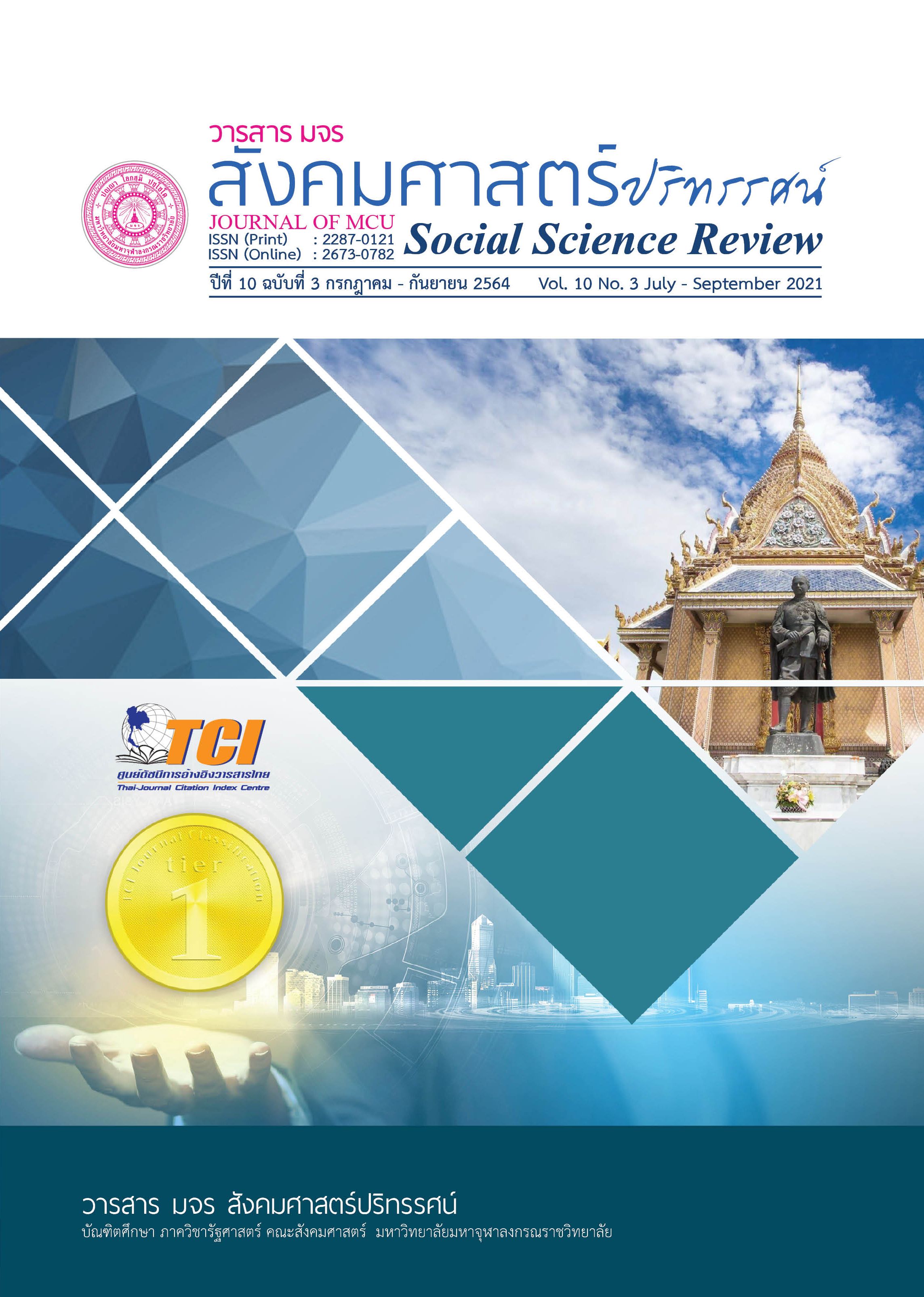การศึกษาศักยภาพการจัดการท่องเที่ยวเชิงเกษตรโดยชุมชนบ้านคลองอาราง ตำบลบ้านแก้ง อำเภอเมืองสระแก้ว จังหวัดสระแก้ว
คำสำคัญ:
ศักยภาพ, การจัดการการท่องเที่ยว, การท่องเที่ยวเชิงเกษตรบทคัดย่อ
การวิจัยครั้งนี้มีวัตถุประสงค์เพื่อศึกษาศักยภาพการจัดการท่องเที่ยวเชิงเกษตรโดยชุมชนบ้านคลองอาราง เป็นการวิจัยแบบผสานวิธี โดยใช้วิธีการเก็บรวบรวมข้อมูลจากการจัดประชุมกลุ่ม (Focus Group) การวิเคราะห์ SWOT และการเก็บแบบสอบถามโดยใช้แบบประเมินมาตรฐานคุณภาพแหล่งท่องเที่ยวเชิงเกษตร เป็นเอกสารอ้างอิงหลักจากผู้ให้ข้อมูลสำคัญ ได้แก่ ผู้นำชุมชน เกษตรกร และผู้มีส่วนเกี่ยวข้อง จำนวน 50 คน
ผลการวิจัยพบว่า บ้านคลองอารางมีศักยภาพชุมชนในการบริหารจัดการการท่องเที่ยวเชิงเกษตรด้านศักยภาพชุมชน ในด้านมีแหล่งท่องเที่ยวที่มีศักยภาพ เป็นแหล่งท่องเที่ยวเชิงเกษตรที่สอดแทรกวิถีชีวิตของคนในชุมชน มีกิจกรรมการท่องเที่ยวที่หลากหลาย สามารถเชื่อมโยงกับแหล่งท่องเที่ยวอื่น ๆ ในท้องถิ่นได้ในอนาคต รวมถึงการแบ่งพื้นที่การใช้ประโยชน์ในการท่องเที่ยวชัดเจน ศักยภาพชุมชนในด้านวิถีชีวิตชุมชน มีแหล่งท่องเที่ยวมีวิถีชีวิตเกษตร เช่น การทำการเกษตรตามหลักปรัชญาเศรษฐกิจพอเพียง แหล่งท่องเที่ยวมีทัศนียภาพโดยรอบที่สวยงาม เช่น สระหลวง Sky walk และเส้นทางป่าชุมชน เป็นต้น มีพิธีบวชป่าในบริเวณเขตป่าชุมชนของบ้านคลองอาราง และการละเล่นนางด้ง ศักยภาพด้านทรัพยากรบุคคลของชุมชน คือ ประชาชนในชุมชนมีความสามัคคี มีความร่วมมือในด้านต่าง ๆ ซึ่งเป็นผลจากการมีผู้นำเข้มแข็งและมีวิสัยทัศน์ ทำให้บ้านคลองอารางเป็นชุมชนเข้มแข็ง นำไปสู่กระบวนการมีส่วนร่วมในการบริหารจัดการการท่องเที่ยวเชิงเกษตรได้อย่างมีประสิทธิภาพ
เอกสารอ้างอิง
กระทรวงการท่องเที่ยวและกีฬา. (2561). แผนพัฒนาการท่องเที่ยวแห่งชาติ ฉบับที่ 2. กรุงเทพฯ: สำนักงานกิจการโรงพิมพ์องค์การสงเคราะห์ทหารผ่านศึก.
กระทรวงการท่องเที่ยวและกีฬา. (2549). องค์ประกอบการท่องเที่ยวโดยชุมชน. กรุงเทพฯ: กระทรวงการท่องเที่ยวและกีฬา.
กรมการท่องเที่ยว. (2553). คู่มือการประเมินมาตรฐานคุณภาพแหล่งท่องเที่ยวเชิงเกษตร. กรุงเทพฯ: กระทรวงการท่องเที่ยวและกีฬา.
ขวัญชนก พุทธจันทร์. (2563). การท่องเที่ยวเชิงเกษตร. กรุงเทพฯ: สำนักพิมพ์มหาวิทยาลัยเกษตรศาสตร์.
เทพกร ณ สงขลา. (2556). รูปแบบการจัดการทรัพยากรเกษตรเพื่อการท่องเที่ยวเชิงเกษตรที่ยั่งยืนในอำเภอช้างกลาง จังหวัดนครศรีธรรมราช (ดุษฎีนิพนธ์ปรัชญาดุษฎีบัณฑิต). สงขลา: มหาวิทยาลัยสงขลานครินทร์.
วิไลลักษณ์ รัตนเพียรธัมมะ. (2561). รูปแบบการท่องเที่ยวเชิงเกษตรโดยการมีส่วนร่วมของชุมชนเขตสายไหม. วารสารร่มพฤกษ์ มหาวิทยาลัยเกริก, 36(3), 11-44.
สุจิตราภรณ์ จุสปาโล. (2558). การจัดการท่องเที่ยวเชิงเกษตรโดยชุมชน บ้านบางเหรียงใต้ อำเภอควนเนียง จังหวัดสงขลา. วารสารมหาวิทยาลัยศิลปากร, 35(2), 89-103.
สุภางค์ จันทวานิช. (2553). การวิเคราะห์ข้อมูลเชิงคุณภาพ. กรุงเทพฯ: จุฬาลงกรณ์มหาวิทยาลัย.
Cronbach, L. J. (1951). Coefficient alpha and the intern a structure of tests. Psychometrika, 16(3), 297-334.
Denzin, N. (1978). The research act: a theoretical introduction to sociological methods (2nd ed). New York: Mc Graw-Hill.
Taware, P. (2000). Agri–tourism: Innovative Supplementary Income Generating Activity for Enterprising Farmers. Retrieved July 9, 2020, from http://www.agritourism.in/.../Agri-Tourism_Concept_Note.pdf
ดาวน์โหลด
เผยแพร่แล้ว
รูปแบบการอ้างอิง
ฉบับ
ประเภทบทความ
สัญญาอนุญาต
ลิขสิทธิ์ (c) 2021 วารสาร มจร สังคมศาสตร์ปริทรรศน์

อนุญาตภายใต้เงื่อนไข Creative Commons Attribution-NonCommercial-NoDerivatives 4.0 International License.
เพื่อให้เป็นไปตามกฎหมายลิขสิทธิ์ ผู้นิพนธ์ทุกท่านต้องลงลายมือชื่อในแบบฟอร์มใบมอบลิขสิทธิ์บทความให้แก่วารสารฯ พร้อมกับบทความต้นฉบับที่ได้แก้ไขครั้งสุดท้าย นอกจากนี้ ผู้นิพนธ์ทุกท่านต้องยืนยันว่าบทความต้นฉบับที่ส่งมาตีพิมพ์นั้น ได้ส่งมาตีพิมพ์เฉพาะในวารสาร มจร สังคมศาสตร์ปริทรรศน์ เพียงแห่งเดียวเท่านั้น หากมีการใช้ภาพหรือตารางหรือเนื้อหาอื่นๆ ของผู้นิพนธ์อื่นที่ปรากฏในสิ่งตีพิมพ์อื่นมาแล้ว ผู้นิพนธ์ต้องขออนุญาตเจ้าของลิขสิทธิ์ก่อน พร้อมทั้งแสดงหนังสือที่ได้รับการยินยอมต่อบรรณาธิการ ก่อนที่บทความจะได้รับการตีพิมพ์ หากไม่เป็นไปตามข้อกำหนดเบื้องต้น ทางวารสารจะถอดบทความของท่านออกโดยไม่มีข้อยกเว้นใดๆ ทั้งสิ้น





